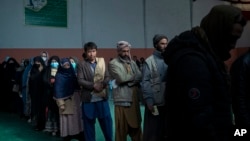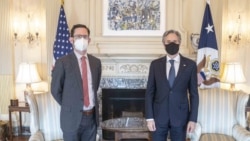The United States’ special representative for Afghanistan Monday began his first trip to Europe and Asia to discuss developments in the South Asian nation, where almost 23 million people, including children, are threatened with starvation.
Ambassador Thomas West’s first stop will be Brussels where his discussions with allies and partners will focus on the way forward on Afghanistan.
"I look forward to advancing America’s vital interests and supporting the Afghan people,” West said in a pre-trip tweet. “The international community must act together to be effective,” the U.S. envoy stressed.
The United Nations has warned that more than half of Afghanistan’s estimated 40 million population is likely to go hungry this winter unless more funds are forthcoming from donors. The World Food Program said in a statement Monday that fuel costs are up, food prices are soaring, fertilizer is more expensive, and all of this feeds into the unfolding Afghan crisis.
The return to power of the Islamist Taliban in Afghanistan last August after the withdrawal of U.S.-led foreign troops has plunged the country into an economic crisis and increased Afghan humanitarian needs to unprecedented levels, which stem from years of war and a prolonged widespread drought.
The international community has refused to grant diplomatic recognition to the Taliban government mainly over human rights concerns under the Islamist movement’s rule.
The absence of legitimacy led to suspension of several billions of dollars in annual foreign assistance to Kabul and blocked the Taliban’s access to about $10 billion in Afghan assets, mostly held in the U.S. Federal Reserve. The sanctions have made it extremely difficult for the Taliban to pay salaries or import essential goods.
Dilemma Over Taliban
Analysts say Washington and other Western governments have few good options in Afghanistan: They can either try to work with the Taliban, and in effect collude with human rights violations, or watch the worsening crisis from afar and see 20 years of development work reversed.
U.S. National Security Advisor Jake Sullivan, in an interview CNN aired on Sunday, noted that Washington remains the largest humanitarian donor to Afghanistan and provided nearly a half-billion dollars in funding just this year alone.
The advisor defended the reliance on aid organizations, arguing the Biden administration was “not yet in a position to be able to provide money directly” through the Taliban leadership in Afghanistan.
“We think that is the best way to actually help the people of Afghanistan without creating a circumstance in which some of those funds could be used for purposes that are problematic to the national security interest of the United States,” Sullivan said.
“Until we see a substantially improved approach to everything from inclusive government to other elements that we are discussing with them (the Taliban) regularly, our focus, our emphasis is going to continue to be on providing funding in the hundreds of millions of dollars just this year alone and to mobilize the rest of the international community through international organizations and non-governmental organizations,” he added.
Sunday, the Taliban appointed 43 provincial governors and police chiefs in a bid to solidify their rule.
The Islamist group formed an interim government in Kabul in September, but the global community has been pressing the Taliban to install a governance set up that represents all Afghans, including women and minorities.
The Taliban have dismissed criticism of their government and repeatedly assured the global community they will protect human rights of all Afghans, including women and minorities. The Islamist group has demanded diplomatic recognition and unfreezing of Afghan assets abroad to be able to prevent an economic meltdown and provide urgent assistance to those in need.
"What the Taliban should note is that they risk remaining unrecognized by the international community like last time if they don't bring non-Taliban into governance posts in Afghanistan, and that will not be good news for the country," Torek Farhadi, a political analyst and former Afghan government adviser, told VOA.





